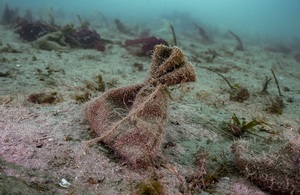England’s largest ever seagrass planting hits new milestone
£2.5 million LIFE Recreation ReMEDIES project, led by Natural England, has now planted seagrass across a total of 3.5 hectares of seabed.

England’s largest ever seagrass restoration project has reached a new milestone by planting around 70,000 seed bags spanning 3.5 hectares of seabed. (Credit: Ocean Conservation Trust).
England’s largest ever seagrass restoration project has reached a new milestone by planting around 70,000 seed bags spanning 3.5 hectares of seabed, which will provide vital habitat for marine life.
The £2.5 million LIFE Recreation ReMEDIES partnership to ‘Save Our Seabed’ led by Natural England and funded by the EU LIFE Programme, was launched in July 2019. It is seeking to protect and restore sensitive seabed habitats which are at risk.
Habitats such as seagrass meadows, mangroves and tidal marshes, are increasingly being recognised for their essential carbon capture abilities - seagrass can be as effective at absorbing and storing carbon as our woodlands. It also provides habitat for sea life including juvenile fish, seahorses and jellyfish, cleans surrounding seawater and helps to stabilise the seabed which can help to reduce coastal erosion. However, research shows the UK has lost at least 44% of its seagrass since 1936.
The UK seabed is threatened by a variety of factors, from seagrass wasting disease (SWD) to pollution and physical disturbance from activities such as the anchoring, launching and mooring of leisure boats.
Natural England is leading efforts to combat UK seagrass losses, in partnership with other organisations including the Ocean Conservation Trust, covering five Special Areas of Conservation in Southern England. To support seagrass recovery in these areas, partners are surveying and mapping seagrass beds to help inform recreational marine users; undertaking studies to better understand how these recreational activities impact seagrass and introducing voluntary No-Anchor Zones. Advanced Mooring Systems are also being trialled, which are designed to interact less with the seabed.
The ReMEDIES partnership has been planting seagrass in the Plymouth Sound and Solent Maritime Special Areas of Conservation (SACs) with its restoration partner Ocean Conservation Trust. The partnership aims to plant a total of eight hectares of seagrass across these two SACs.
Tony Juniper, Chair of Natural England, said:
Seagrasses are a precious part of our marine ecosystem, providing a habitat for a wide variety of species from juvenile fish to our seahorse populations. They are an essential mechanism for carbon capture and a healthy marine environment.
Seagrasses are vital but they are also very delicate. With their existence threatened by disease, pollution, and human activity, we must all work together to support the recovery of seagrasses – and harness their power to combat climate change and restore our natural environment.
Mark Parry, Development Officer at the Ocean Conservation Trust, said:
Seagrass meadows are one of the most valuable and biodiverse habitats on the planet. By restoring seagrass, we are ensuring they will continue to provide vital environmental benefits to both people and the planet.
We are very proud to be the restoration lead in this project and are grateful for communities in both Plymouth and the Solent volunteering their time to help us restore such an important habitat.
Following further seagrass planting efforts this week, an impressive total of 3.5 hectares of seabed has now been planted, comprising 2.5 hectares in Plymouth Sound and 1 hectare in Solent Maritime. It takes about 10,000 seagrass seed bags per half a hectare, and approximately 70,000 seed bags have been packed by volunteers and deployed into the sea overall.
Later this year, sea dives are due to take place at healthy seagrass meadows in the Solent and Cornwall to collect seagrass seeds. The seeds will then be sent to the ReMEDIES cultivation laboratory at the National Marine Aquarium (NMA) in Plymouth and cared for until they are ready to be planted.
As part of ReMEDIES, the Ocean Conservation Trust is also trialling methods of planting seedlings directly into the seabed. They are currently growing square ‘pillows’ of multiple seedlings in the lab of the NMA which will be transferred to the seabed at the Plymouth Sound site using divers.
Information and key learnings from ReMEDIES will be shared with other marine conservation projects to help benefit seabed habitats across the UK and Europe.
Further information:
- ReMEDIES is funded by the EU LIFE programme and led by Natural England in partnership with the Ocean Conservation Trust (OCT), Marine Conservation Society, Royal Yachting Association, and Plymouth City Council/Tamar Estuaries Consultative Forum.
- The project covers five Special Areas of Conservation (SACs), which are designated areas under the European Union’s Habitats Directive in place to protect special habitats and species. The five areas are: Isles of Scilly Complex (SAC), Fal and Helford (SAC), Plymouth Sound and Estuaries (SAC), Solent Maritime (SAC), and Essex Estuaries (SAC).
- Find out more about LIFE Recreation ReMEDIES by following on Twitter, Instagram, and Facebook @EULIFERemedies, or visiting www.saveourseabed.co.uk.
Updates to this page
-
Added a further information section.
-
First published.